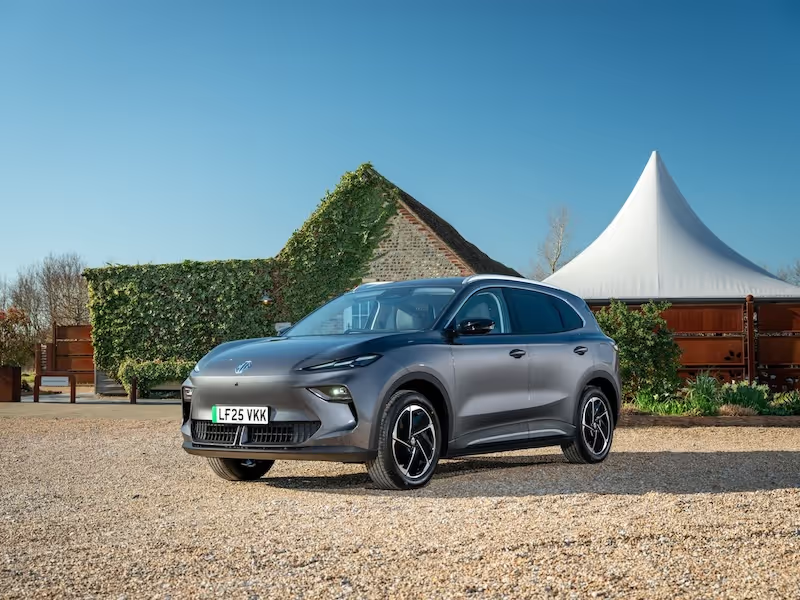The Electric Car £3,750 Grant: The Winners, The Losers & What it Means for Drivers

The UK government has announced the return of electric car grants, offering discounts of up to £3,750 for eligible electric vehicles under £37,000. This represents a significant opportunity for drivers who may be considering electric vehicle adoption - especially when paired with a salary sacrifice scheme.
At a glance:
- Historic Boost: The previous Plug-in Car Grant was shuttered in 2022, so this announcement really marks a turning point for Governmental support in regards to EV uptake.
- Grant Details: The scheme provides a discount of between £1,500 to £3,750 for electric vehicles costing up to £37,000. The highest grants are reserved for the cleanest, most environmentally friendly vehicles.
- Impact on Monthly Costs: We expect these grants to reduce the monthly lease costs for all taxpayers who may be considering an electric vehicle. Proposing any sort of figure would be merely speculative at this point, as the monthly savings will be determined on a case-by-case basis depending on the specific vehicle and lease terms.
- Rollout Timeline: The £650 million scheme runs for three years from July 2025, with manufacturers able to apply for funding from July 16th. The discount will then be automatically applied to vehicles as they become available in the coming weeks.
- How many will be eligible for the grant?
- The total amount available for the scheme is £650 million.
- Average grant amount is an average of £2,625 per vehicle.
- That’s around 250,000 subsidised cars available.
The Winners
European Manufacturers: EVs manufactured in Asia, including in China, are expected to be excluded from new UK electric car purchase incentives once strict new criteria is applied, giving European manufacturers a significant competitive advantage. Brands like Volkswagen, BMW, Mercedes and Renault that build their cars in Europe with clean energy grids are likely to meet the sustainability criteria.
UK and European Dealerships: Dealers selling eligible vehicles will see increased uptake and potentially higher margins as government support drives demand.
Companies with EV Salary Sacrifice schemes: The grants enhance the value proposition of salary sacrifice schemes, making them even more attractive to employees and employers.
Higher-Rate Taxpayers: Those using salary sacrifice schemes will see the greatest combined benefits, stacking grant savings with substantial tax advantages.
The Losers
Chinese Manufacturers: Chinese-made EVs may not qualify for the electric car grant based on the environmental standards of production facilities. This significantly impacts brands like BYD & Genesis, who may currently offer competitive pricing - but build their cars in regions with carbon-intensive energy grids.
Budget-Conscious Consumers: The exclusion of affordable Chinese EVs reduces choice in the lower price segments. Some of the most competitively priced electric vehicles will not benefit from government support, potentially making them less attractive relative to grant-eligible alternatives.
Used EV Market: The focus on new vehicles leaves the used market without direct support, despite representing where most consumers are able to get behind the wheel of an EV. We explore this further, below.
Traditional ICE Manufacturers: Manufacturers heavily invested in internal combustion engines face increased pressure as electric vehicles become even more competitively priced through government support.

Why is the Government Reintroducing the Electric Car Grants?
The reintroduction of electric car grants addresses several critical challenges in the UK's transition to electric mobility:
Accelerating EV Adoption: With electric vehicle sales currently at 21.6%*, the government aims to reach its 28% target for 2025. These grants make EVs more financially attractive to bridge the gap.
Supporting the 2030 Transition: As the ban on new petrol and diesel car sales approaches in 2030, these grants provide crucial financial support during the transition period.
Reducing Financial Barriers: The grants help offset the higher upfront costs of electric vehicles, making them accessible to a broader range of consumers.
Boosting Salary Sacrifice Effectiveness: Importantly, these grants are fully compatible with salary sacrifice schemes, which continue to offer the most tax-efficient way to access electric vehicles. When combined with existing salary sacrifice benefits, drivers can achieve unprecedented savings.
What This Means for Overall Lease Costs
While the £3,750 grant represents a significant discount that should lead to savings, there are important nuances to consider when evaluating the overall impact on lease costs:
Manufacturer Discount Adjustments: Currently, manufacturers are offering substantial discounts on new electric vehicles to stimulate sales. The introduction of government grants may lead some manufacturers to reduce these existing discounts, potentially increasing their profit margins rather than passing all savings to consumers. This means the net cost reduction may equate to less than the full grant amount.
Residual Value Volatility: The grants create additional complexity around residual values - the projected worth of vehicles at the end of lease terms. In three years' time, vehicles that benefited from these grants are likely to be worth less on the used car market. This depreciation risk must be factored into lease calculations by finance companies, potentially offsetting some of the upfront grant benefits through higher monthly payments.
Net Impact Expectations: We anticipate an overall decrease in lease costs, but the magnitude may be smaller than the headline grant figures suggest. The actual savings will vary significantly between different vehicles, manufacturers and leasing companies.
Not all vehicles, manufacturers, or leasing companies will respond equally to these grants. Some key considerations include:
Manufacturer Strategies: The way the discount is applied is up to the manufacturers’ discretion; some manufacturers will remain aggressive in their pricing to shift units, offering excellent discounts in addition to the government grant. Others may use the grants to maintain margins while reducing their own promotional offers.
Take Leapmotor for example, a Chinese manufacturer, who have just announced their very own £3,750 ‘LEAP-GRANT’ discount - available now. Their statement reads: “We’ve decided to act now because we want to give customers clarity, confidence and immediate savings – and make the switch to electric a simple choice.”
MG has similarly announced a £1,500 grant for the MG4 and MGS5 available to private UK customers.
Leasing Company Approaches: Different leasing companies will take varying approaches to risk and pricing too. Some will be more aggressive in passing savings to customers, while others may be more conservative.
How to Maximise Your Savings from the Grant
Given the complexity and uncertainty around how these grants will impact overall costs, working with an experienced salary sacrifice broker grants you the industry knowledge and connections to achieve the best savings.
Gain Access to Multiple Funders: We work with a panel of leading lease funders, ensuring access to the most competitive rates and terms across the market.
Benefit from an Extensive Dealer Network: Our relationships with over 300 dealerships and all major manufacturers mean we can identify which partnerships offer the best combination of grant eligibility and additional discounts.
Tap In To Market Intelligence: As winner of the Best Salary Sacrifice Broker 2025, we have the expertise to navigate the changing landscape and identify genuine value opportunities.
Do a Comprehensive Comparison: Rather than being tied to a single manufacturer or leasing company, we can compare offers across the entire market to find the best deals for your specific circumstances.
Even with the new grants, salary sacrifice remains the most tax-efficient way to access electric vehicles. The combination of:
- Low Benefit-in-Kind rates (currently 3% for electric vehicles)
- National Insurance savings for both employee and employer
- Income tax relief through salary sacrifice
- VAT benefits for business users

Which Electric Cars Are Under £37,000 and Eligible for the £3,750 Grant?
Whilst the Government is still yet to publish exact guidelines and rules about which cars will qualify, it’s generally intended for vehicles under £37,000. As such, here’s a short list of our top picks for EVs that are likely going to benefit from the grant. Please note, these are the prices before the grant has been applied.
Our top picks:
- Dacia Spring - £14,995
- Renault 5 - £22,995
- MG4 - £26,995
- Volvo EX30 - £33,060
- Hyundai Kona - £34,995
Get a Quote
Potential Downsides: Impact on the Used EV Market
While the grant offers significant benefits for new car buyers, it's important to consider the broader implications for the electric vehicle market, particularly the used car sector.
Used Market Concerns: The focus on new vehicle grants entirely overlooks the used EV market, where many drivers actually make their vehicle purchases. Currently, two in five used EVs are priced under £20,000, offering excellent value for cost-conscious buyers. However, the new grants may inadvertently impact this market in several ways:
Residual Value Pressure: As grant-supported new EVs enter the market, they will eventually filter through to the used market with artificially depressed values. This could further reduce residual values for current EV owners and potentially make leasing more expensive as finance companies adjust for lower end-of-term values.
Market Distortion: The grants create a two-tier system where new car buyers receive substantial government support while used car buyers - who represent the majority of the market - receive no assistance. This approach may not effectively address the broader challenge of EV adoption across all income levels.
Missed Opportunities: The scheme could have been designed to support the used market through battery health certification requirements, manufacturer-approved used EV programmes or dealer training initiatives. These measures would have a minimal cost, but could have significantly boosted confidence in used EVs.
Consumer Sentiment: While new car grants may generate positive headlines, they don't address the concerns of the majority of car buyers who shop in the used market. True mass adoption of EVs will ultimately depend on a thriving, affordable secondhand market.
Despite these concerns, the grants should encourage more drivers to consider EVs, with many potentially discovering excellent value in the used market once they begin their research.
What to do next:
The reintroduction of electric car grants represents a significant opportunity, but navigating the changing market requires expertise and access to comprehensive options. Market conditions are dynamic, with manufacturers and leasing companies still adjusting their strategies.
For the best outcomes, consider working with a salary sacrifice broker who can:
- Monitor market changes and identify genuine value opportunities
- Access the full range of eligible vehicles and funding options
- Provide transparent advice on the real-world impact of grants on lease costs
- Ensure you benefit from both government grants and salary sacrifice tax advantages
The transition to electric driving has never been more financially attractive, but maximising your savings requires expert guidance through an increasingly complex landscape. If you’d like to view our latest deals, then simply search cars, here.


.jpg)


